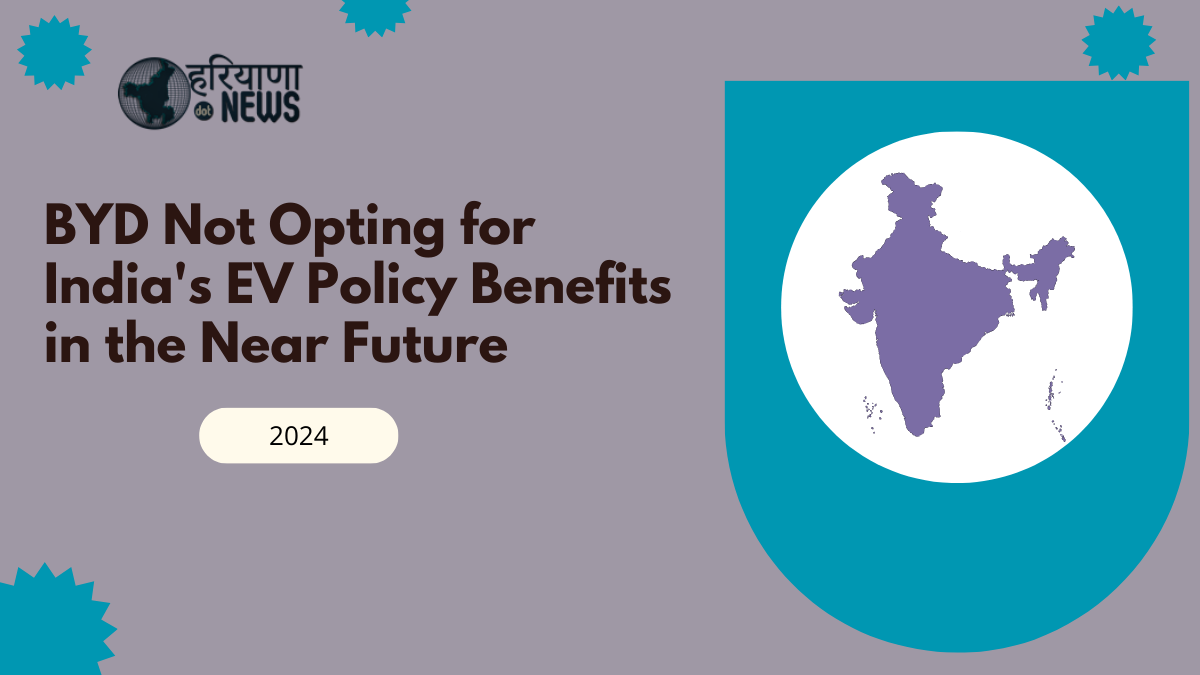BYD has decided not to take advantage of the benefits offered under India’s new electric vehicle (EV) policy in the near term, despite the incentives provided by the government for global manufacturers. A senior company official shared that while the policy was designed to attract global EV makers like BYD, the Chinese electric vehicle giant isn’t ready to pursue these benefits at this time.
Policy Overview: Reduced Customs Duty for EV Imports
Under the new policy, companies are permitted to import fully built electric four-wheelers (CBUs) at a reduced customs duty rate of 15% as long as they meet certain conditions. However, BYD, which recently launched its eMAX 7 multipurpose vehicle priced between ₹26.9 lakh and ₹29.9 lakh, is focusing on other strategies to cater to India’s growing market demand.
BYD’s Short-Term Strategy: Focus on Homologation
Rajeev Chauhan, head of BYD India’s Electric Passenger Vehicles Business, emphasized that the company is focusing on homologation in the short term rather than leveraging the policy benefits. Homologation is the process of certifying vehicles for sale by ensuring they meet local safety and regulatory standards. This approach allows BYD to meet the demand for its high-volume models quickly without immediate local manufacturing investment.
Why BYD Is Holding Back on Policy Benefits
BYD representatives thoroughly reviewed the policy but concluded they were not ready to apply in the short term. Chauhan explained that while having a manufacturing plant in India offers advantages, the company isn’t prepared to commit to this just yet. He confirmed that BYD would not pursue the policy’s benefits at this time, although he declined to comment on whether geopolitical tensions between India and China played a role in the decision.
India’s New EV Policy: Encouraging Global Investments
India’s government introduced the new EV policy in March 2023 to attract major players like Tesla and BYD. The policy allows the import of a limited number of vehicles with reduced customs duties—15% on cars priced at $35,000 or more—for a five-year period. To benefit from this, manufacturers must invest at least ₹4,150 crore (around $500 million) to set up local manufacturing facilities for electric vehicles.
Manufacturing Commitment and Conditions
Under the policy, companies are required to establish manufacturing plants within three years of receiving approval, with an initial requirement of achieving 25% domestic value addition (DVA). This target must increase to 50% within five years. Additionally, companies can import a maximum of 8,000 electric four-wheelers annually at the reduced duty rate. Unused import quotas can also be carried forward.
 Mahindra Unveils XEV 9e and BE 6e Electric SUVs in India: Features, Pricing, and Advanced Innovations
Mahindra Unveils XEV 9e and BE 6e Electric SUVs in India: Features, Pricing, and Advanced Innovations
 Automobile Exports From India Surge 14% in April-September Period
Automobile Exports From India Surge 14% in April-September Period
 2024 Mercedes-Benz E-Class Long Wheelbase Launched in India: Key Features, Pricing, and Competition
2024 Mercedes-Benz E-Class Long Wheelbase Launched in India: Key Features, Pricing, and Competition
 Mahindra Thar Roxx: The Positives and Negatives After a 10,000km Drive
Mahindra Thar Roxx: The Positives and Negatives After a 10,000km Drive




BYD’s Market Exploration and Homologation Process
In the short term, BYD is focused on exploring the Indian market and identifying opportunities that exceed the government’s import quotas. Chauhan noted that the company is taking the homologation route to ensure its vehicles meet Indian standards. Homologation allows BYD to certify its models, including the newly launched eMAX 7 and SEAL sedan, under the Economic Commission for Europe (ECE) certification.
Short-Term Focus on Importing Vehicles
BYD India is currently importing its vehicles under the ECE certification, which limits the number of units to 2,500 annually. Chauhan mentioned that the company’s short-term strategy doesn’t involve immediate manufacturing investments in India. Instead, BYD will wait for the right opportunity before making such a commitment.
BYD’s Commitment to Innovation with eMAX 7
BYD remains dedicated to introducing cutting-edge electric vehicles to the Indian market. The newly launched eMAX 7, available in six- and seven-seater configurations, showcases the company’s focus on innovation and sustainability. Chauhan highlighted that BYD will continue to bring the latest global advancements to meet the evolving needs of Indian consumers.
Click Here To Know More.






